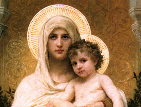


+ Ensure fair distribution, subsidiarity, economic opportunity, justice, and food security for everyone everywhere. Seventh Work of Justice and Peace
Return to Week of Novenas for Justice and Peace ... Continue to Home Index
Dorothy Day was an early advocate of women's rights who wrote for radical leftist newspapers in
the early part of this century. She was a hedonist, a bohemian as they said in those days -- but
when she looked in her heart of hearts, she found it empty. By the grace and providence of God,
she found our Lord and was baptized into the Catholic Church. Thus began a journey which led
to the founding of the Catholic Worker movement, together with Peter Maurin and the other first
Workers.
She worked her entire life to create structures of beauty and goodness. In the midst of the slums
of New York, they provided hospitality to the poor while working for social justice. They saw
the truth -- that the works of mercy and the works of justice and peace are one and the same,
different aspects of the same journey, all going the same direction.
Long before it was a theological mantra, the "preferential option for the poor" was a living reality
in the life and work of Dorothy Day. She was an informed critic of current events, always
looking for the Gospel truth in a given situation, and finding Jesus in the poor, rejected, and
marginalized.
Her example inspires us today to consider how we can ensure fair distribution, subsidiarity,
economic opportunity, justice, and food security for everyone everywhere. First we must see the
structures of sin that bind us down in oppression and poverty, and then we can discern ways
around the structures, or ways to redeem them, or dismantle them. We can buy farms and
dedicate them for the purpose of raising food for the hungry. We can organize microenterprise
co-operatives in every city to provide opportunity for the poor. We can look at our own
individual situations, and adopt lifestyles of simplicity and frugality, rejecting the culture of
materialistic conspicuous consumption in favor of a life of justice. Live simply, that others may
simply live. We can discern the cry of the widow and orphan in our own neighborhoods, and be
the hands and feet of God in relieving distress and creating justice.
All of this is not utopia, it is within our grasp. The price of a hundred and sixty acre farm can be
less than the price of the typical middle-class suburban house. And that one farm could provide
more than three tons of flour -- each and every year. Volunteers from the parish could provide
the labor. Parishes could join together, perhaps as a diocese, and buy several farms and a small
mill to grind the wheat into flour, and package it for distribution. Or vegetables could be grown,
and canned in a diocesan canning kitchen for distribution to the poor.
We can put together packages of capital for small groups (say 6 to 12) of poor people, and
provide them with proper business advice and assistance in starting their own microenterprise co-operatives, that will eventually grow into full time jobs. Some of those could be food co-ops,
perhaps offering 50 basic products, in areas where grocery stores are scarce.
So during this week where we honor Mary as Our Lady of Victories, and ask for the intercession
of Dorothy Day of New York, disciple of the Lord and Catholic Worker, let us turn our
contemplation towards the structures of beauty and goodness that are necessary to redeem our
alienated and wounded world.
Selected Links
Dorothy Day Library on the Web
Return to Week of Novenas for Justice and Peace ... Continue to Home Index